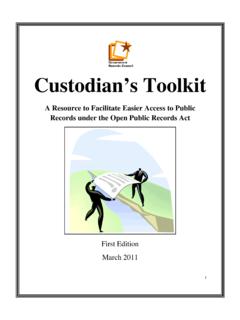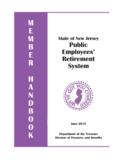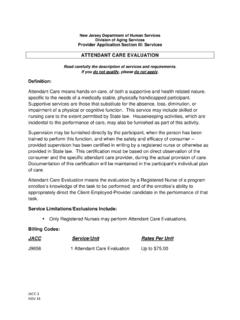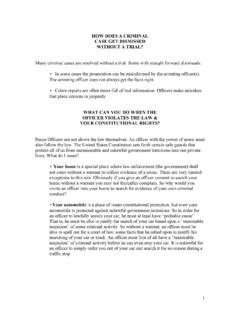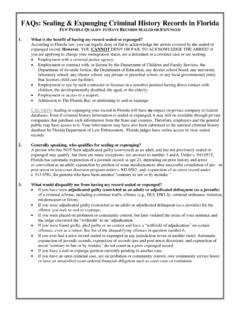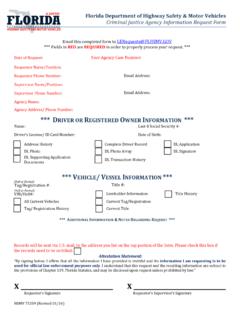Transcription of How to Expunge Your Criminal and/or Juvneile Record
1 How to Expunge your Criminal and/or Juvenile Record What is an Expungement? An expungement is the removal and isolation of all records on file within any court, detention or correctional facility, law enforcement, Criminal justice agency or juvenile justice agency concerning a person's apprehension, arrest, detention, trial or disposition of an offense within the Criminal or juvenile justice system. Unless otherwise provided by law, if an order for expungement is granted, the adult arrest, the Record of law enforcement taking you into custody as a juvenile, conviction, adjudication of delinquency, disposition and any related proceedings are considered not to have occurred. See the section on Comparison of Adult and Juvenile Terms for a glossary of terms that are specific to juvenile court. The New Jersey expungement law states in detail who is eligible for an expungement. You should review the current applicable provisions of 2C:52-1 through 2C:52-32 to determine if you are eligible.
2 An eligible person must prepare and file a Petition for Expungement. The Petition for Expungement must be filed in the Superior Court in the county where the arrest or prosecution took place. A judge then decides whether the person should be granted an Expungement Order. In general, these materials provide basic information about how to file a Petition for Expungement. These materials do not provide specific advice about a particular legal problem that you may have, and they are not a substitute for seeing a lawyer. If you encounter a problem, or are in doubt as to whether you need a lawyer, talk to one. NOTE: These materials have been prepared by the New Jersey Administrative Office of the Courts for use by self-represented litigants. The guide, instructions, and forms will be periodically updated as necessary to reflect current New Jersey statutes and court rules. The most recent version of the forms will be available at the county courthouse or on the Judiciary's Internet site ( ).
3 However, you are ultimately responsible for the content of your court papers. Acknowledgment: The New Jersey Judiciary would like to acknowledge Legal Services of New Jersey for allowing us to modify their expungement guide. The work that you see in this Pro Se Expungement Package is largely a product of their efforts. Kit Revised: 04/2009, CN 10557 (How to Expunge your Criminal and/or Juvenile Record ) page 1 of 34. Things to Think About Before You Represent Yourself in Court Try to Get a Lawyer What You Should Expect If You The court system can be confusing, and it is Represent Yourself a good idea to get a lawyer if you can. If While you have the right to represent you cannot afford a lawyer, you may wish to yourself in court, you should not expect any contact the legal services program in your special treatment, help, or attention from the county to see if you qualify for free legal court. You must still comply with the rules services. Their telephone number can be of the court, even if you are not familiar with found in your local yellow pages under them.
4 The following is a list of some things Legal Aid or Legal Services. the court staff can and cannot do for you. Please read it carefully before asking the If you do not qualify for free legal services court staff for help. and need help in locating an attorney, you can contact the bar association in your We can explain and answer questions county. Their telephone number can also be about how the court works. found in your local yellow pages. Most We can tell you what the requirements county bar associations have a lawyer are to have your case considered by the referral service. The county bar lawyer court. referral service can supply you with the We can give you some information from names of attorneys in your area who usually your case file. are willing to handle your particular type of We can provide you with samples of case. Such attorneys are sometimes willing court forms that are available. to consult with people in your situation at a reduced fee.
5 We can provide you with guidance on how to fill out forms. There are also a variety of organizations of We can usually answer questions about minority lawyers throughout New Jersey, as court deadlines. well as organizations of lawyers who handle specialized types of cases. Ask your county We cannot give you legal advice. Only court staff for a list of lawyer referral your lawyer can give you legal advice. services that include these organizations. We cannot tell you whether or not you should bring your case to court. Keep Copies of All Papers We cannot give you an opinion about Make and keep for yourself copies of all what will happen if you bring your case completed forms and any canceled checks, to court. money orders, sales receipts, bills, contract We cannot recommend a lawyer, but we estimates, letters, leases, photographs and can provide you with the telephone other important documents that relate to your number of a local lawyer referral case.
6 Service. We cannot talk to the judge for you about what will happen in your case. We cannot let you talk to the judge outside of court. We cannot change an order issued by a judge. Kit Revised: 04/2009, CN 10557 (How to Expunge your Criminal and/or Juvenile Record ) page 2 of 34. Comparison of Adult and Juvenile Terms The table below compares commonly understood Criminal terms to terms specific to juvenile delinquency matters. Juvenile delinquency matters should not be considered the same as adult Criminal actions. The process for expunging juvenile records, however, is the same as that for expunging adult Criminal matters. In fact, if you have both adult and juvenile records that you wish to Expunge , you should include all matters in your expungement petition. Criminal Term Juvenile Term Arrest Taking juvenile into custody Conviction Adjudication of delinquency Sentence Disposition Indictment No equivalent - A juvenile is charged with an offense without an indictment process Jail, prison or incarceration Secure facility, youth house or detention center or juvenile justice institution (specific names may vary).
7 Pretrial intervention program Diversion - Juvenile Conference Committee or Intake Services Conference Glossary of Terms Deferred Disposition: In a deferred disposition, the court adjudicates the juvenile delinquent and sets forth conditions for the juvenile to meet. If the juvenile meets the terms of those conditions, then the disposition will be dismissed pursuant to the court's order. Diversion: A diversion is the process of removing minor juvenile cases from the full judicial process on the condition that the accused participates successfully in a rehabilitative process, such as a juvenile conference committee or a juvenile intake conference. If conditions entered into by these diversions are met, then it results in a dismissal of the case, and no appearance before a judge is required. Indictable Offense: A Criminal offense that includes first, second, third and fourth degree crimes. An indictable offense does not include disorderly persons, petty disorderly persons or municipal ordinance violations.
8 Kit Revised: 04/2009, CN 10557 (How to Expunge your Criminal and/or Juvenile Record ) page 3 of 34. How to File for an Order to Expunge your Criminal and/or Juvenile Record Locate your Records If you must locate your records on your own In order to prepare your expungement for a juvenile delinquency matter, contact petition and prove your eligibility, you will the Superior Court Family Division Office need to get the following information: in the county where you were taken into custody as a juvenile, where charges were The date of your arrest as an adult or filed, or where the adjudication occurred, when you were taken into custody as and they will advise you how copies of those a juvenile. records can be obtained. A list of county The statute(s) and the offense(s) for Family Division Offices appears at the end which you were arrested, taken into of this guide. custody as a juvenile, convicted or adjudicated delinquent. If you were taken into custody as a juvenile and no charges were filed against you, you The original indictment, accusation, must contact the appropriate law summons, docket number, warrant enforcement agency for information related number or complaint number.
9 To that incident. Include all, if more than one. The date of the disposition, which You might also contact the county could be the date of the conviction or prosecutor. A list of county prosecutors'. adjudication of delinquency, date of offices with addresses and telephone not guilty verdict or date of numbers appears at the end of this guide. dismissal. Explain that you are interested in expunging your records and ask for the information The specific punishment or other listed above, or ask to look at your file if this disposition. is permitted. You may also be able to find information you need on disorderly persons If you had an attorney when you were offenses by contacting the clerk of the arrested as an adult and/or taken into municipal court(s) in which you were custody as a juvenile and charged, check prosecuted, or the police department first to see if he or she has this information involved in your arrest(s) as an adult or that in your case file; if so, this can save you took you into custody as a juvenile.
10 If you quite a bit of time. cannot get all of the information, you need to follow Step 1 on the next page. If you must locate your records on your own for an indictable/ Criminal conviction or The numbered steps that follow explain arrest, contact the Superior Court Criminal what forms you will need to fill out and Case Management Office in the county what to do with them. Specific directions on where the arrest or conviction occurred and filling out each form appear before each of they will advise you how copies of those the attached forms. Follow these directions records can be obtained. A list of county carefully. Each form should be typed or Criminal Case Management Offices appears clearly printed on 8 " x 11" white paper at the end of this guide. only. Forms may not be filed on a different size or color paper. Kit Revised: 04/2009, CN 10557 (How to Expunge your Criminal and/or Juvenile Record ) page 4 of 34. Step 1: Request State Police Criminal Step 2: Complete These Forms History Record Fingerprint Check Form A - Petition For Expungement This step is only necessary if you do not The Petition for Expungement states that already have your Criminal /juvenile history you are requesting an Expungement Order information about your arrests, charges and and states why you qualify.
